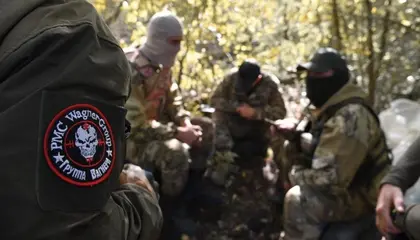The ongoing power tussle between the Kremlin and its conventional armed forces and the mercenary group Wagner continues to burst into the open, with a lack of Russian success in Bakhmut sparking a blame game of sorts played out on social media.
What’s the latest?
JOIN US ON TELEGRAM
Follow our coverage of the war on the @Kyivpost_official.
In a series of Telegram posts this week, Wagner Chief Yevgeny Prigozhin admitted his forces were not likely to take the city of Bakhmut anytime soon in the face of increasing Ukrainian resistance.
Last year Russian President Vladimir Putin claimed to have annexed the entire Donetsk region, including Bakhmut and even bigger cities farther west. But the fierce fighting for the city is now the longest-running battle of Russia’s campaign and Moscow’s key military objective.
Taking Bakhmut would be a major win for Moscow, though analysts say its capture would be mainly symbolic as the town holds little strategic value.
What’s the latest from Bakhmut?
Russia has been trying to encircle and capture the battered industrial city ahead of Feb. 24, the first anniversary of what it terms its “special military operation” in Ukraine.
In early February Wagner Group mercenaries, many of them convicts reportedly recruited by Prigozhin personally, forced Ukrainian troops to evacuate the adjacent salt-mining town of Soledar.
Subsequent news reports from both sides suggested that Bakhmut would soon be surrounded by Wagner fighters and Ukrainian forces inside wiped out.

Ukrainian Drone Reportedly Strikes Russian-Seized Ship in Crimea
Yet this has not happened, and according to Prigozhin himself, the situation in Bakhmut is swinging in Ukraine’s favor.
Earlier this week, he said: “The conditions for encircling the enemy in the northern regions [around Bakhmut] do not exist. The enemy [the Ukrainian army] is becoming more active in all sectors, and is pulling in more and more new reserves.
“Every day between 300 to 500 fresh [Ukrainian] fighters enter Bakhmut from all directions. [Ukrainian] artillery fire is intensifying every day.”
Then, in a series of social media posts fired off overnight Feb. 15-16, he said his men might, theoretically, be able to capture Bakhmut in “March or April,” but only if all Russian forces in sector successfully surrounded the city first and cut off all supply.
So Russia’s lack of success is Wagner’s fault?
Obviously the developing situation around Bakhmut does not look good for Prigozhin and his mercenary fighters, and he is now looking to shift the blame elsewhere.
On Thursday, Prigozhin slammed Moscow’s “monstrous bureaucracy” for slowing military gains.
“To take Bakhmut you have to cut all supply routes. It’s a significant task,” he said, adding: “Progress is not going as fast as we would like. Bakhmut would have been taken before the New Year, if not for our monstrous military bureaucracy.”
What’s going on behind the scenes?
As with anything to do with the internal workings of the Kremlin, getting a definitive idea of anything going on behind the scenes is a difficult task, but the fact that the spat between Moscow and Wagner is so public makes it impossible to deny that something is going on.
Prigozhin has previously accused the Russian military of attempting to “steal” victories from Wagner, a sign of his rising clout and the potential for dangerous rifts in Moscow.
Wagner’s claims to have captured ground without help from the regular army have also spurred friction with senior military leadership.
Prigozhin is clearly engaged in a public relations drive to boost his profile and has had some major PR successes during Russia’s full-scale invasion of Ukraine.
He’s gone from the head of a shady outfit used unofficially and on a deniable basis by the Kremlin to carry out dirty work around the world, to leading Russia’s main military thrust in its so-called “special operation.”
Unlike Russia's generals, who have been criticized for shirking the battles, the stocky and bald Prigozhin regularly poses for pictures alongside mercenaries allegedly on the front lines.
Most recently, Prigozhin posted from the cockpit of a SU-24 fighter jet and challenged Ukrainian President Volodymyr Zelensky – who has been pleading for jets – to an aerial duel.
But as a piece by Carnegie Endowment analyst Tatiana Stanovaya recently noted: “Still, the businessman’s position remains informal. Putin has agreed to outsource certain state functions, but has not legitimized Prigozhin himself.
“The president has never seen the shady entrepreneur as a replacement for official institutions such as the army or security services, nor has he ever tried to use Prigozhin as a counterbalance to those institutions, for that would be completely at odds with Putin’s concept of complete and coordinated power.”
What does the future hold for Prigozhin?
Again, this is difficult to ascertain with any degree of certainty, but Putin undoubtedly finds himself in a tricky position – he can’t allow Prigozhin to become so powerful that he becomes a challenger to his position of president, but at the moment and with Russia’s conventional forces performing so badly, he can’t afford to cut him loose and lose Wagner as a fighting force.
Stanovaya concludes: “For now, Prigozhin is not prepared to challenge Putin. But – and it’s an important ‘but’ – it’s hard to remain sane and level-headed when you’ve lost a large part of your personal army to the bloody meat grinder of war.
“As long as Putin is relatively strong and capable of maintaining the balance between various groups of influence, Prigozhin is not dangerous. But the slightest change could prompt Prigozhin to challenge the authorities: perhaps not Putin himself, at first. War makes monsters of men, and their recklessness and desperation can become a challenge to the state if it shows even the slightest sign of weakness.”
You can also highlight the text and press Ctrl + Enter






